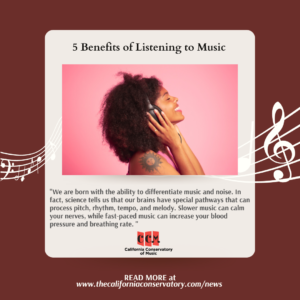July 20, 2022
5 Benefits of Listening to Music
It’s pretty incredible how the simple act of listening to a piece of music can bring a rush of memories back to your head or make you feel happy and at peace.
We are born with the ability to differentiate music and noise. In fact, science tells us that our brains have special pathways that can process pitch, rhythm, tempo, and melody. Slower music can calm your nerves, while fast-paced music can increase your blood pressure and breathing rate.
While we certainly need more studies to confirm the many benefits music has on us as humans, there are several positive effects we are already sure of.
Come dive in as we explore the 5 benefits of listening to music.
Relieves Stress
Listening to music when you are feeling stressed out can decrease the levels of cortisol in your body. Cortisol, for those who don’t know, is the stress hormone. Essentially, listening to music can counteract the negative impact of chronic stress.
Stress is the cause of 60% of diseases and illnesses in humans. A recent study showed that people who actively participate in the music-making process had a boosted immune system, even more so than from listening passively. Essentially, singing along to a piece of music or playing around with percussion can make you healthier.
Who knew?
If you’re ever feeling stressed out during the workday, turn on your favorite song and sing along!
Helps You Sleep
Did you know that more than 30% of Americans suffer from insomnia?
A recent study showed that people who listen to classical music 45 minutes to an hour before going to bed sleep significantly better than those who don’t listen to anything at all.
If you ever find that you are having trouble sleeping at night, you might consider trying to play a bit of Mozart or Bach.
Not only can music help you fall asleep faster, but it can also help facilitate deeper and longer sleep, which will leave you feeling refreshed when you wake up in the morning rather than groggy and unrested.
Improves Concentration
If you’ve ever tried working in a noisy room or a room that is totally silent, you might have felt it was hard to concentrate. Of course, everyone is different, and some people don’t like listening to music while studying or working.
However, it’s worth trying out, as many research studies say listening to the right kind of music while working or studying can put you in the right mindset for getting work done.
Studies say that the best genres to study or work to include classical music, instrumental chill-out music, or the simple sounds of nature. Doing so can improve focus, lessen distractions, increase concentration, and reduce learning time.
Helps Develop Social Skills
There are many children that face the challenge of adapting to their environment socially. One of the best ways to help a child with social developmental difficulties is to introduce them to music. We recommend teaching your child how to play a musical instrument or encouraging them to be part of a singing group.
Music can be a major help in developing social skills, showing a person how to relate with others and work in a team setting. It can also show children how to appreciate their achievements and awards while giving them a sense of discipline and leadership.
Improves Motor Skills
Similar to playing sports, playing a musical instrument can develop a child’s motor skills. It requires motor skills to simply dance or sing along to music. Add the coordination necessary to play a musical instrument, and a child can develop quickly in incredible ways.
This is because making music is incredibly involved. It goes beyond the fingers or the voice. To make music, you must use your eyes and ears, as well as a number of small and large muscles throughout your body at once.
In a way, making music teaches the body and the mind to work as a single unit.
Music For Life
As you can see, there are many benefits to music, whether you are a child or an adult. For these reasons, it’s important to expose yourself and your children to music as much as possible. Sing, play instruments, attend local concerts, or play musical games.
Reach out to the California Conservatory of Music to enroll yourself or your child in private music lessons!
Keep music with you at all times, and you can lead a happier, healthier life.

